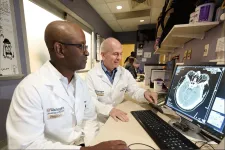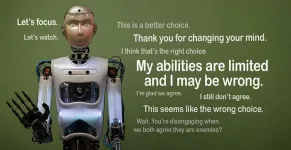(Press-News.org) Highlights:
Researchers from Michigan State University and South Shore Hospital in Massachusetts have uncovered a connection between two common diabetes drugs — insulin and metformin — identified in wound exudates of diabetic foot ulcers, which may improve their healing.
While analyzing wound exudate (the fluid the body moves and secretes to the site of an injury), researchers discovered the presence of metformin in patients who take the drug orally.
The researchers then explored metformin’s relationship to insulin. They found that for patients who take both insulin injections and oral metformin, the amount of metformin found in wounds significantly increases. It was previously believed that there was no interaction between insulin and metformin.
The team’s findings may have immediate relevance to health care professionals treating patients with diabetic foot ulcers and biotech developers of wound dressings.
EAST LANSING, Mich. – People with chronic diabetic foot ulcers could soon have a new way to treat their wounds for faster healing and fewer hospital stays. Researchers from Michigan State University and South Shore Hospital have uncovered that the combination of two common diabetes drugs — injectable insulin and orally-administered metformin — increases the amount of metformin at the wound site. As metformin can accelerate wound healing, this could be welcome news for the 18.6 million people worldwide (1.6 million in the U.S.) who develop a diabetic foot ulcer, or DFU, in their lifetimes.
“We collected human exudates from diabetic foot ulcers and analyzed their composition,” said Morteza Mahmoudi, an associate professor in the Department of Radiology and Precision Health Program in the MSU College of Human Medicine. “One of the things that we noticed in the composition of the exudates — which has not been observed anywhere else — was the presence of metformin.
“Until now, pharmacological studies had not found an interaction between insulin and metformin,” he added. “Our study shows that there could be at least an indirect role of consuming both insulin and metformin in a way that metformin can end up in a wound area where it enhances the body’s capacity to heal.”
Mahmoudi and co-researcher Lisa Gould, a plastic surgeon and wound care clinician at South Shore Hospital and a clinical associate professor of medicine at Brown University, recently published a paper in ACS Pharmacology and Translational Science that details the previously unheard of connection between insulin and metformin in DFU exudates.
The team’s work was funded by a grant from the National Institute of Diabetes and Digestive and Kidney Diseases.
“Our findings can affect the way that clinicians approach healing chronic wounds,” Mahmoudi said. “For example, if a patient gets a wound, the synergistic role of insulin and metformin could be helpful.
“Additionally, wound dressing developers need to consider the interactions of anything they put on top of wounds with exudates,” he continued. “Exudates can interact with the wound dressings and affect their safety and therapeutic efficacy. Additional research will be evaluating this.”
END
Millions of people with diabetic foot ulcers could benefit from new research discovery
2024-09-04
ELSE PRESS RELEASES FROM THIS DATE:
Adding anti-clotting drugs to stroke care ineffective, clinical trial finds
2024-09-04
Stroke patients who survive a blood clot in the brain’s blood vessels are prone to developing new blockages during their recovery periods, even if they receive vessel-clearing interventions. In an effort to avoid further clots, doctors at 57 sites around the U.S. tested a possible solution: the addition of anti-coagulant drugs to medicine that dissolves blood clots.
But results from the clinical trial, led by Opeolu Adeoye, MD, head of the Department of Emergency Medicine at Washington University School of Medicine in St. Louis, indicate two such drugs did not improve outcomes.
The findings are available Sept. 4 in The New England Journal ...
Research Center awarded $14.4 million to advance new manufacturing solutions for microelectronics
2024-09-04
A new Energy Frontier Research Center (EFRC), supported by the Department of Energy’s Office of Science and led by SLAC National Accelerator Laboratory, was awarded $14.4 million over four years to advance manufacturing of microelectronics by investigating approaches to building their components in fundamentally new ways.
Instead of moving electrons through conducting metallic interconnects in the miniscule and ever shrinking parts of devices such as microchips used in computers and cell phones, the researchers propose to move information via spin waves that can propagate through semiconductors ...
Notre Dame researchers create new tool to analyze embodied carbon in more than 1 million buildings in Chicago
2024-09-04
The built environment — which includes the construction and operation of buildings, highways, bridges and other infrastructure — is responsible for close to 40 percent of the global greenhouse gas emissions contributing to climate change.
While many building codes and benchmarks have focused on constructing “greener,” more energy-efficient new buildings, it is not enough to seek to reduce emissions in operations, said Ming Hu, the associate dean for research, scholarship and creative work in Notre Dame’s School of Architecture. Rather, policymakers and industry leaders ...
SMU researcher helps develop new technique to explore oceanic microbes
2024-09-04
DALLAS (SMU) – When SMU researcher Alexander Chase was a young boy, the sheer diversity of plants in Earth’s tropical rainforests fascinated him. He found himself wondering, what new species were out there, waiting to be unearthed? That curiosity is why Chase now collects samples from Earth’s oceans using a new technique called Small Molecule In situ Resin Capture (SMIRC), which could be the first step in uncovering compounds that lead to next-generation antibiotics.
Microbial natural products come from microorganisms, or microbes, and account for many of today’s essential medicines, including most antibiotics. Microbes are too small to see without ...
New guideline for Helicobacter pylori includes change to primary treatment recommendation
2024-09-04
The American Journal of Gastroenterology has published a new guideline on the treatment of Helicobacter pylori (H. pylori) infection.
The corresponding author on the guideline is William D. Chey, M.D., chief of the Division of Gastroenterology and Hepatology at Michigan.
H. pylori is a bacterium that infects over half the people in the world, though most are asymptomatic.
It can cause dyspepsia, peptic ulcer disease and gastric cancer.
This latest clinical practice guideline notes that its prevalence in North America is decreasing, but it still infects 30-40% of the population.
A previous guideline ...
Making desalination more efficient, by way of renewable energy
2024-09-04
(Santa Barbara, Calif.) — With freshwater becoming an ever scarcer resource, desalination of ocean water is increasingly employed to bridge the gap between supply and demand. However, desalination is energy-intensive, often powered by fossil fuels, so meeting the need for freshwater can exacerbate the challenge of reducing atmospheric CO2, the main driver of climate change.
Yangying Zhu, an assistant professor in the Department of Mechanical Engineering at UC Santa Barbara, wants to address that conundrum. Now, a two-year, $500,000 seed grant from the Advanced Research Projects Agency-Energy (ARPA-E) ...
Preventing car battery fires with help from machine learning
2024-09-04
One of the most critical safety concerns for electric vehicles is keeping their batteries cool, as temperature spikes can lead to dangerous consequences.
New research led by a University of Arizona doctoral student proposes a way to predict and prevent temperature spikes in the lithium-ion batteries commonly used to power such vehicles.
The paper "Advancing Battery Safety," led by College of Engineering doctoral student Basab Goswami, is published in the Journal of Power Sources.
With the support of $599,808 from the Department of Defense's Defense Established Program to Stimulate Competitive Research, Goswami and his adviser, aerospace ...
Heavy metal cadmium may be tied to memory issues for some
2024-09-04
MINNEAPOLIS – The heavy metal cadmium, which is found in the air, water, food and soil, is known to cause health problems. A new study published in the September 4, 2024, online issue of Neurology®, the medical journal of the American Academy of Neurology, examined if thinking and memory skills were associated with cadmium exposure. They found no association when they looked at the group as a whole. However, when looking at Black and white people separately, it found cadmium may be tied to problems with thinking and memory skills in white people. ...
Strictest abortion-ban states offer least family support
2024-09-04
View a breakdown of the abortion restrictions by state below
States with early abortion bans are less likely to offer paid time off after childbearing, to give poor children nutritional support or to expand access to reproductive health care
Marginalized people and those with low socioeconomic status are overrepresented in ban states and least likely to overcome the barriers that bans impose
CHICAGO --- States with the most severe post-Dobbs abortion restrictions also have the fewest policies in place to support raising families, reports a new Northwestern Medicine study.
“We found that in the states that most severely ...
Study: People facing life-or-death choice put too much trust in AI
2024-09-04
In simulated life-or-death decisions, about two-thirds of people in a UC Merced study allowed a robot to change their minds when it disagreed with them -- an alarming display of excessive trust in artificial intelligence, researchers said.
Human subjects allowed robots to sway their judgment despite being told the AI machines had limited capabilities and were giving advice that could be wrong. In reality, the advice was random.
“As a society, with AI accelerating so quickly, we need to be concerned about the potential for overtrust,” said Professor Colin ...






